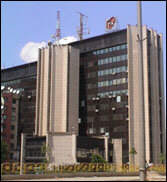 PRIVATIZATION OF SOE´S PRIVATIZATION OF SOE´S |
The old socialist system of the Former Republic of Yugoslavia showed three types of ownership, Socially Owned Property, Public Property and Private Property. According to Minister of Trade and Industry Mr. Jakupi"There are 350 companies beginning from very big companies as: Trepca, the mining facility, then Ferronikeli, or KEK- the national electricity provider, that can become a public company later. These are companies that have received the biggest investments so far so we have to take special care of them, otherwise this capital will be destroyed in a year." The delay in the reactivation of these enterprises caused much concern due to the deterioration of the little assets these companies might still posses. After much assessment and deliverance within the UN Security Council, it was finally decided that "privatization" should be expedited and they must proceed as soon as possible. In May 2002 the first privatization draft was approved. The head administrator of Kosovo gave the infant Government and Parliament as well as other Kosovar governmental organs a chance to express their views on the new legislation. Initially Kosovo´s representatives were told that the document and its contents were not negotiable. Only two remarks were accepted, from the many that the Government of Kosovo had. No further information on modifications to the law have been released.

PTK´s headquarters in Prishtina
There is wide consensus amongst experts and policy makers that the only way to prevent the deterioration of these enterprises is privatization; up to now the challenge has been how to circumvent the problem of socially owned property. UNMIK in conjunction with Pillar IV of the European Union, whose main duty was to accomplish the transformation of the enterprises, had originally devised a way for transforming the property without interfering in the rights of the workers in order to activate them. This first attempt for the reactivation of the few viable companies in Kosovo was called commercialization. Commercialization involved the simple rental of the capital equipment to the interested investors. Local and international experts warned that considering the many adverse conditions Kosovo was facing at the time, commercialization was a wrong turn to take.
Their forecasting seems to have been accurate. From the 300 to 350 social enterprises within the territory of Kosovo only 1/3 were labeled as viable, and of this only 11 were actually commercialized with relative success.
The one enterprise that could be said to have been successfully commercialized was "Sharrcem" in Hani I Elezit which has been rented for a period of ten years for exploitation and marketing rights to the international cement giant Holcim Group. The company however is hardly being utilized since the group is able to produce cement at cheaper prices from the over 100 cement factories they own all around the world. So it has been kept unproductive for the last 6 months.

Heavy Machinery at one of Kosovos main Industrial giants EUROMETAL
The remaining 10 commercialized enterprises, amongst which is the brick factory IMN, Vita Oil, and others, have encountered severe problems and they could hardly be called a success. This situation forced UNMIK to treat the issue of privatization of social enterprises more seriously and find a long-term sustainable solution that would satisfy workers and potential investors.
In June 2002, Kosovo´s privatization got under way. A new method to determine the ownership of State and Socially Owned Enterprises was devised and the process has moved ahead. Privatizing socially owned enterprises, had been the thorn on the side of UNMIK officials for over two years. The Prime Minister of Kosovo, Mr. Ibrahim Rexhepi, is of the opinion that before privatization what is first needed is " to create the legislative background in accordance with the rules of the World Bank and the IMF, that will open its office very soon in Kosovo, and other international financial institutions". Nevertheless, on Wednesday, June 12th 2002 the SRSG in Kosovo, Mr. Michael Steiner signed the regulation that would make privatization a reality. The Kosovo Trust Agency (KTA) was conceived to monitor the privatization and restructuring of all Socially Owned Enterprises and implementing the current regulations for their transition into private hands. The Socially Owned enterprises " will be divided into three groups: the first group-the companies that will become private, that are doing good, healthy and functioning. In the second group we will include the companies that need to be put on their legs first and privatized after. In the third group we will include the companies that do not have a chance for transformation. They will be declared insolvent, no mater how big they are, we are not going to save them because of some nostalgic feelings", says the Minister of Trade and Industry, Mr. Jakupi. KTA even plans to establish a Special Chamber within the Supreme Court specially designed for the needs of this restructuring.
| 
"The KTA gives a mechanism that enables us to move the socially owned enterprises into the private sector without the negative effects or having to answer of the ownership rights, that is in the UN resolution 1244 and we will see how far we will go with that. So, we want to do that in the private sectors so that the assets of these companies can be put into productive use with whatever assets there are left", says Mr. Andy Bearpark, DSRSG for Economic Recovery Reconstruction & Development in Kosovo.
The Kosovo Trust Agency will execute the privatization of Socially Owned Enterprises and it will exercise that right through a Spin-Off method. Mr. Bearpark is very clear on the fact that in regards to the policy on privatization:"it is for the UN to determine, and yes the KTA would be involved in the implementation of that policy". According to the new legislation to be implemented by KTA, the Spin-Off of the old enterprise will transform it into a new and viable shareholding company. The obligations of the old entity however would not be carried over to the new enterprise. Critics argue that the issue of property ownership remains unclear even through this process. The new established enterprise and the assets of the old enterprise will be organized as a new share holding company, in other words as an enterprise with limited liabilities. After all assets of the previous enterprise have been mobilized and made as liquid as possible, the new created enterprise will be sold to private investors in shares. Kosovar management, political leaders and workers continuously criticized this method; Kosovar Serbs have also had a number of objections regarding the basis of privatization law.
Recent modifications to the law and the redirection of the privatization process have concluded that the KTA will also have competencies on the process of restructuring and later divestment of over 50 Public Enterprises that Kosovo currently posseses. It has yet to be decided which method will be used for their transformation. In the category of public enterprises are KEK, PTK and the Mining Giant of Trepça, whose fate is also still unknown and is the cause of much tension between Serbians and Kosovar Albanians.
In the beginning Kosovar leaders and Belgrade alike were reluctant to accept the terms of the new legislation. Both sides remarked that the Spin-Off method would not be effective enough and would fall short to provide a sense of security that investors require in order to make the massive capital investments needed to upgrade them to international competitive standards. Kosovar Albanians claim that if privatization of real estate does not occur, investors will not be attracted. Local management also argues and insists that no investor would be interested in the assets of the company alone and that large investments would only come with a solid assurance of legal ownership over the property. Another objection argued by Albanians is that they request that the proceeds to be gathered in the liquidation process of the assets are not blocked as the regulation suggest. They would rather prefer that this capital is reinvested in Kosovo, or if there is no other solution to be deposited in local banks that would increase their ability to provide larger credit lines to the enterprises.
Belgrade also objects to this process of privatization, claiming that the Kosovar enterprises have outstanding debts to Serb banks that must first be fulfilled and if they are not this will try to block privatization in every way. In regards to what the next step is the President of the Chamber of Commerce, Mr. Ismajl Kastrati, says "UNMIK and Provisional Government must find the way to stimulate investments from Diaspora as well as from locals. The manners and forms to stimulate these investments are already well-known such as favor taxes, stimulating interest, industrial zones, grants, and even discharge of profit dedicated for investments".
Regardless of the path taken, the process of transformation of enterprises has started taking place. It is expected that the first enterprises will be privatized in the beginning of September 2002. There are plenty opportunities for foreign investors, the question is will UNMIK and the new Kosovar leaders be able to provide the necessary assurances that weary foreign investors demand?. |

